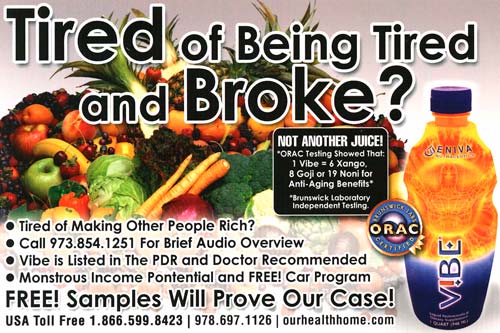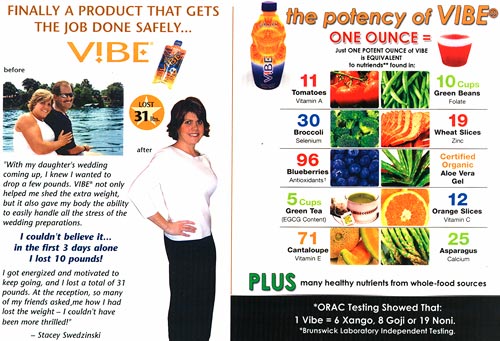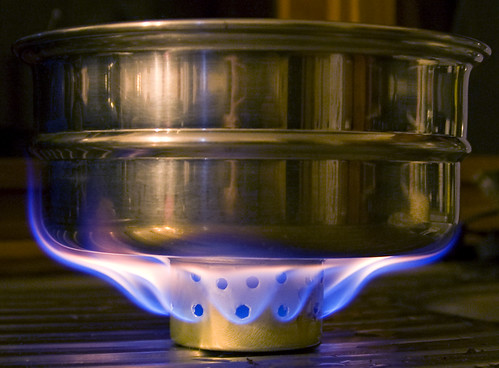In the shadowy netherworld of multi-level marketing, a lot of people are trying to sell juice.
It isn't ordinary juice, though. You wouldn't get far trying to shift orange, apple or grape juice via the trapezoid. The same multiple commission stages that make Amway floor polish too expensive would crank the price of your juice up far past the supermarket price of similar products.
The juice the network-marketers are trying to sell is much more special. Allegedly. It's usually from one or another improbably-named tropical tree or Chinese berry, and it's supposed to be good for what ails you.
Not that the companies that make the juices will say that. Oh, no. They're all hiding behind the US Dietary Supplement Health and Education Act of 1994, a.k.a. the DSHEA, which allows makers of "nutritional supplements" to sell pretty much whatever they like, without being required to prove efficacy or safety. As long as they don't make any therapeutic claims.
The great thing about multi-level marketing, for the people behind these programs, is that they can stay clean and avoid making illegal claims about their "dietary supplements", while their desperate-for-a-buck "distributors" say all sorts of outrageous things to try to shift product. It's like the white-van speaker racket, where a company brings crappy speakers with names similar to those of real speaker companies into the country, then hands them over to the guys in the vans. And, at the end of the day, takes their (large) share of the money. The speaker importers, like the MLM "supplement" companies, take pains to point out that they can in no way be blamed for what certain bad apples among their distributor base may do to turn product into profit.

Somehow, this promotional card ended up in our house. It's obviously for a US program; I think it got to us here in Australia packed into a box with an eBay purchase.
This card is perfectly representative of the basic claims made for the phalanx of MLM miracle juices. Apart from ticks for a few of the boxes on the Twenty-Five Ways to Spot Quacks and Vitamin Pushers list, there's:
* Indistinct-enough-to-be-legal health claims.
* A frank statement that this miracle juice is better than all of the other miracle juices. (I'm pretty sure they all say this. It's like the Caliph whose wives were each more beautiful than the last.)
* MAKE BIG $$$MONEY$$$!!! CALL NOW!!!!
This particular juice has a strangely normal name, "Vibe". Close analysis of the better-than-everyone-else part, though, will turn up three of the big names in this field: "Xango" (I'm sorry - "XanGo"), "Goji" and "Noni".
And there's more. "Vemma" (which is allegedly based on mangosteen juice, like XanGo), "Monavie", "Zrii", "NingXia" and "eXfuze". And probably more; that's just all I could Google up before I got bored.
All of these juices are probably better, at least, than Kinoki foot pads, because they do actually have some nutritive value. But the reason why they're supposed to be worth more per bottle than quite fancy wine is that they're all allegedly made from "superfruits". Those are edible (in some cases only technically...) fruits or berries with unusually high "ORAC" scores.
The proud statement that this juice is "ORAC Certified" at first, of course, caused me to think that the Respectful Insolence guy was running a little sideline in dietary supplements. But it's actually talking about "Oxygen Radical Absorption Capacity" measurement. In this case, from "Brunswick Labs".
Surprisingly enough, the ORAC test is actually a real one, and it's quite possible that Brunswick Labs, despite a plethora of not-quite-medical claims on their own Web site, are quite kosher and actually doing real ORAC tests. They don't, at least, look like one of those pure quack-labs that'll analyse a sample of your hair and invariably then discover that you're in life-threatening need of whatever service is provided by the alternative practitioner who commissioned the test.
High ORAC values tell you that there are lots of antioxidants in a given foodstuff. It's common knowledge that antioxidants are terribly good for you, and especially good at slowing the aging process. There's not actually much reason to suppose that this is in fact the case, but common knowledge does not appear to care.
Result: Umpteen funny-named MLM-sold super-expensive ultra-juices that do not necessarily do anything for you that a glass of far cheaper OJ won't.
(And if you buy orange juice instead, you probably won't be endlessly pestered by whoever sold it to you to start selling it yourself, so you can get your share of the failure.)
Here's the other side of the Vibe promotional card:

"Just ONE POTENT OUNCE OF VIBE is EQUIVALENT to nutriends** found in..."
That double-asterisk is presumably supposed to direct you to the two single-asterisk notes about Brunswick Labs ORAC testing, but neither of them explains what a "nutriend" is.
Such amazing nutrient levels don't actually necessarily sound like something you'd want, anyway. Apart from the well-established fact that taking lots of vitamins generally just gives you very expensive wee, one ounce of this stuff is supposed to give you "11 tomatoes worth of vitamin A".
One medium whole tomato should give you 20 per cent of your daily Vitamin A requirement. So slurping down tons more of that vitamin may give you something in common with Douglas Mawson.
(The juice-pushers will, of course, tell you that the Recommended Daily Allowances for vitamins are far too low. I refer you, once more, to the Twenty-Five Ways.)
And then there's "30 broccoli". 30 broccoli whats? The tiny little florets? 30 stalks from ground level up? 30 pounds?
And "Certified Organic Aloe Vera Gel", quantity not specified. But since I don't think anybody's ever demonstrated aloe to have any particular nutritional constituents that can't be found in greater concentrations in something that doesn't taste nearly as horrible, I presume a little goes a long way.
And so on.
But don't worry - even though it's so darn packed with nutrients, drinking Vibe will somehow make you thinner... on account of how "energized" you'll be!
("More energy" would appear one of those just-fuzzy-enough claims that "supplement" companies love to toss around. Searching Google for "more energy" juice mlm currently turns up well over 10,000 hits. Some of these MLM-ed supplements are packed to the gills with caffeine and not-necessarily-legal-any-more ephedra, of course, but I doubt that's the case for most of the super-juices.)
It's the names of all these miracle juices that really get to me, though.
Xango! Zrii! Goji! Vemma!
Someone should make a "Multilevel-Marketed Miracle Juice or Star Trek Alien Race?" page, like the "Porn Star or My Little Pony?" one.


